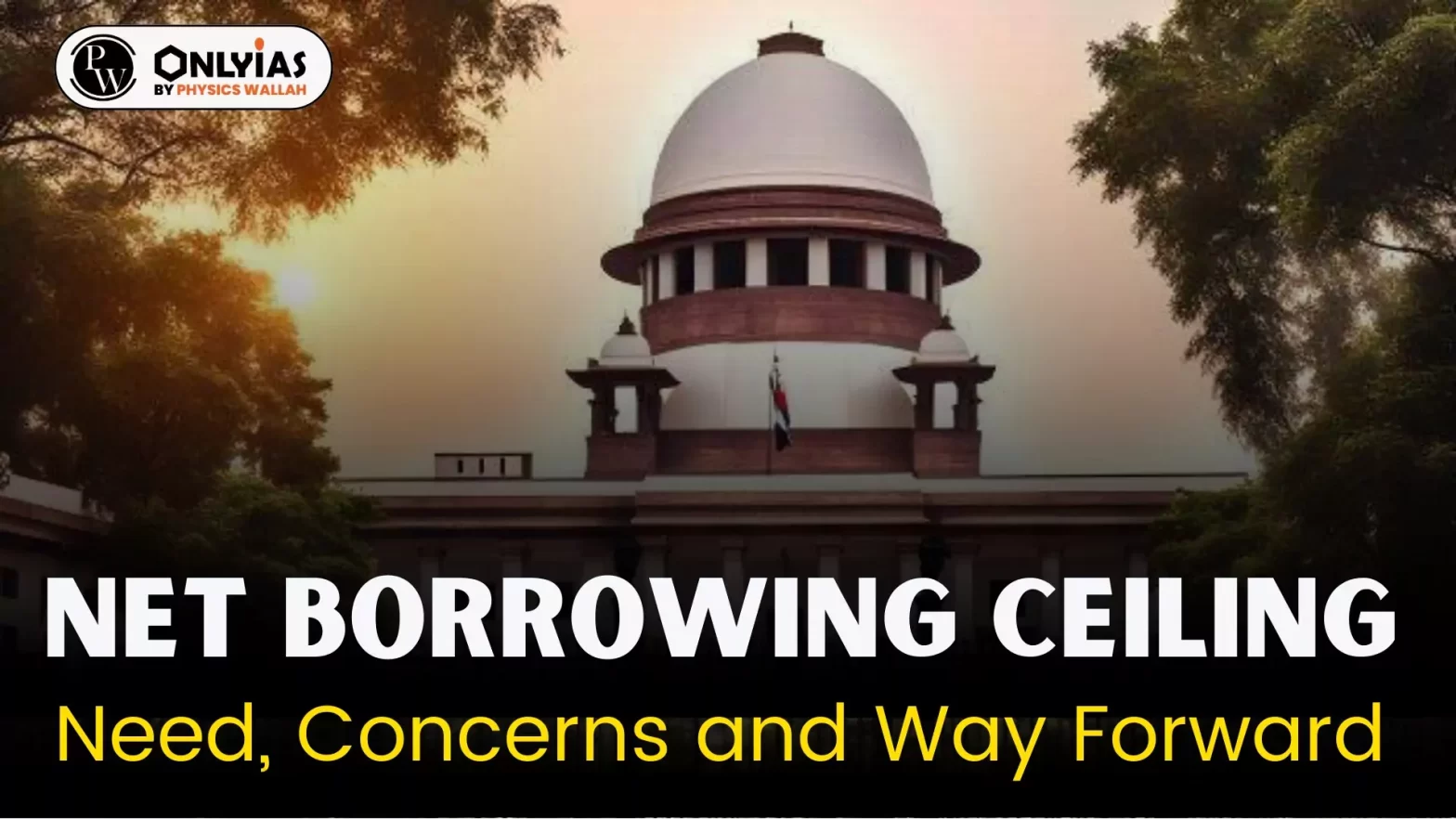Context:
This editorial is based on the news “The severe erosion of fiscal federalism” which was published in the Hindu. Recently, Kerala has moved the Supreme Court contending that the Centre’s imposition of a Net Borrowing Ceiling (NBC) on the State, which limits borrowings from all sources, violates Article 293 of the Constitution.
| Relevancy for Prelims: Fiscal Federalism, Net Borrowing Ceiling, Article 239 and 266 of the Constitution and Fiscal Deficit.
Relevancy for Mains: About the Net Borrowing Ceiling- Need and Concerns. |
About Net Borrowing Ceiling (NBC)
- Limits: It limits the borrowings of States from all sources including open market borrowings. The imposition of the Net Borrowing Ceiling is done by invoking the powers of the Centre under Article 293(3).
- Deductions by Central Government: The Centre has decided to deduct liabilities arising from the public account of the States to arrive at the Net Borrowing Ceiling.
- In addition, the borrowings by state-owned enterprises, where the principal and/or interest are serviced out of the Budget, or through assignment of taxes or cess or any other State revenue, are also deducted from the Net Borrowing Ceiling.
Enroll now for UPSC Online Course
Net Borrowing Ceiling: Concerns & Opposition by Kerala
- On the inclusion of debt taken by state-owned enterprises as the State’s own debt.
- Reason: Major infrastructure projects are funded by the government statutory body, Kerala Infrastructure Investment Fund Board (KIIFB), primarily through extra-budgetary borrowings.
- Since the debt of KIIFB is now included in the Net Borrowing Ceiling, the State government claims that it is not even able to fund pensions and meet expenses for welfare schemes.
- No Power lies to Parliament: Parliament does not have the power to legislate upon the ‘Public Debt of the State’ as it is under Entry 43 of the State List of the Constitution.
- All activities related to public accounts fall within the domain of the State Legislature and the Centre has no power to include the withdrawals from public accounts in the Net Borrowing Ceiling.
- The balances in the Public Account of the State should not be included in the Net Borrowing Ceiling: The State relies upon Article 266(2) of the Constitution which indicates that the money collected by the Central or State government, which do not pertain to the consolidated fund, can be brought under the head of ‘public accounts’.
- Public Accounts: Small savings, security deposits, provident funds, reserve funds and other treasury deposits constitute ‘public accounts’.
- Following Fiscal Discipline: As per the Kerala Fiscal Responsibility Act, 2003 , Kerala shall reduce the fiscal deficit to 3% of the GSDP by 2025-2026.
- When a State Act provides for budget management and fiscal discipline, it is not desirable to have external supervision on the finances of the State by the Centre.
- Budget Management of the State is the discretion of the State Government: Article 202 of the Constitution, it is the State government that is tasked with determining the revenue and receipts and corresponding expenditure and with presenting the Budget of the State before the Legislative Assembly.
Justification By the Central Government
- Article 293(3) of the Constitution: Under this article, the State has to obtain the consent of the Centre to raise ‘any loan’, if ‘any part of the previous loan’ extended by the Centre is outstanding.
- Follow the Recommendation of 15th Finance Commission: The Union Finance Minister said that as per the 15th Finance Commission Report, the Governments at all tiers may observe strict discipline by resisting any further additions to the stock of off-budget transactions and contingent liabilities to attain fiscal sustainability.
- For Transparency: The higher borrowing limit to the Union and State Government is to foster transparency and to avoid build-up of non-transparent liabilities. However, the Finance Commission has not called for the inclusion of the debt of state-owned enterprises in the Net Borrowing Ceiling.
Conclusion
The KIIFB was a novel idea in Kerala to fund infrastructure and development projects through extra-budgetary spending and to deliver social justice. Such a ceiling by the Central Government can lead to a challenge for Indian Cooperative Federalism.
- There is a need to maintain a delicate balance between federal and state powers to uphold democratic principles and ensure equitable development across India’s diverse regions.
Also Read: Interim Budget 2024-2025
![]() 7 Feb 2024
7 Feb 2024

